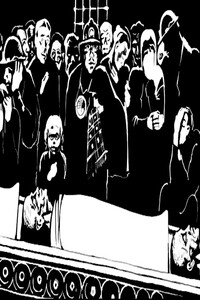День, когда рухнул мир | страница 4
«It’s a bad day today,» I explained to myself.
It’s a bad day. I pushed aside the fountain-pen, crossed my hands and put my head on the table, on these hands of mine.
I closed my eyes.
«Father, if it is not given to the living to comprehend the pain of the earth, then how do the dead sense it?»
«The dead are wiser than you, the living…»
I moved forward. I wanted to hold my father for a while, but at that moment I sensed the yawning gulf between us – he in the other world and I in this one… I wanted so much to help him get out of the grave, that I reached out to him with both hands.
«Be careful, you could fall and kill yourself,» warned my father who was wrapped up in a torn white shroud.… And so disaster came to the people of the Genghiz Hills in the summer of 1953 – it came in a single hour. The children, tending the goats and sheep behind the village, all heard the terrible cries, screams and women weeping. Leaving the sheep and goats on the steppe, jostling each other as they ran, their bare feet flashing, they rushed to the village. What was taking place there was unimaginable – people were embracing each other, saying farewell, making vows and promises, shouting and weeping. Commotion, confusion, chaos – and we young boys were standing with our mouths open, unaware of the misfortune which had befallen the inhabitants of our quiet and cosy village. Perhaps, war had broken out? It dawned upon some of us that it might be a war against the Americans or some other imperialists and we greedily began to examine the enormous military vehicles arid the soldiers rushing everywhere, all of whom seemed to have appeared from under the ground.
«Look, one, two, three. Each of these vehicles has ten wheels,» said Serikbol.
«This is really something… Ten, just like in a story,» we commented as we peered in trying to get into the cabin.
«If this is war, I’m going to join the partisans,» said Serikbol. We became envious, as he was the first to declare this – after all, each of ’ us felt that he was either a soldier or at the very least the «son of a regiment».
«Come on, go home, lads!» shouted a lieutenant-colonel.
«Uncle, tell us – who are we fighting?» I asked him timidly.
«There is no war. Enough of your prattling. Off with you! Home! Your parents are waiting for you. You’re going to be evacuated!» said the lieutenant-colonel angrily.
At that time we did not know what «evacuation» meant, but we immediately had a premonition of foreboding. This misty and mysterious word emanated fear and uncertainty.

